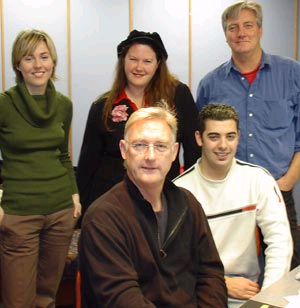AM presenter Tony Eastley and a small team have been broadcasting their program from Broken Hill this week, shifting the focus of the program to regional and rural issues.
Broken Hill was chosen by AM because it sits in the heart of the inland river system and, like so many other outback centres, is suffering one of the worst droughts on record. The ‘Silver City’ is caught between the competing interests of cotton farmers and pastoralists in Queensland and NSW, and irrigators and farmers in South Australia and Victoria.
Eastley’s journalistic experience includes stints as a foreign correspondent, plus radio and tv news reporting and presenting. He spoke to radioinfo about his outback OB:
radioinfo: What are the biggest issues you have been covering during this week in the bush?
Eastley: Health and Water.
Health issues in remote and rural areas are all about access, cost and availability. For example a woman with breast cancer might put off going to a clinic to be examined and then to a specialist because these services are so far away, then it becomes too late.
We also interviewed the Aboriginal Maari-Ma Health Service and found that they are bringing health services to aboriginal people in tents because of this problem. It seems to be working, it’s like an Ag Field Day with a picnic atmosphere when those tent health services set up in marquees in areas around Menindee.
radioinfo: What about water, surely this has been an issue in the bush for years?
Eastley: That’s true, there are places around here that haven’t had drought breaking rain for ten years.
But there is also a new factor that makes this story topical – in the cities now, where you can’t water your garden or hose your car because of water restrictions, people are paying more attention to this issue, so it is timely for us to take another look at it in the way it affects rural people as well.
We found that one of the key issues here is flow. People are pointing the finger upstream to Queensland irrigators such as Cubby Station and saying that what they are doing is affecting everyone else down stream. But Cubby Station says it is acting legally under Queensland regulations and that is where the rain has fallen.
We will be following this up tomorrow in an interview with John Anderson.
radioinfo: How many are there in your team there in Broken Hill?
Eastley: There is the Executive Producer and myself, plus we have Nance Hoxton from ABC Adelaide, Nick Jeremy from Adelaide and Anthony Gerace from ABC Riverland (pictured), and we have help from the local staff here in Broken Hill.
radioinfo: Couldn’t you have done the same content from Sydney?
Eastley: No. I interviewed a grazier on the bank of the river and listeners could hear the sound of bird and fish in the interview. As a reporter you get a better feel for a story when you are on site, and as a listener you get a better picture in your mind.
I think there are too many phone interviews these days. You don’t get the taste and smell of the area, you don’t hear the sounds of the landscape without being there.
Things happen when you are on location that you can’t plan but that make a better story. For instance, yesterday we met the Flying Padre and he took up in his plane to a property where we met some people who we featured in our story on outback health.
radioinfo: Does it help the ABC for you to do something like this?
Eastley: Yes. It’s good for the program’s profile here in the bush and it also raises the country’s profile to urban listeners.
It is hard for rural listeners to reach us when we are in Sydney, but if we can come here they have a chance to connect with us more easily.
radioinfo: As such a high profile presenter on one of the ABC’s flagship current affairs programs, are you worried about an outside organisation monitoring your content and bias?
Eastley: I don’t take exception to management making a management decision to monitor us.
I do worry about two thing though – is the money being spent worth it and who is making judgements.
Who within Rehame will be deciding what is and what is not biased. I hope they have employed some senior journalists to make those kind of decisions and that it’s not some junior casual worker making a judgement on what we are doing. I hope Rehame is employing good people to do this job.
.
Tony Eastley joined the ABC in 1979 after completing a journalist cadetship with The Examiner newspaper in Launceston. He was an ABC foreign correspondent based in Singapore (1988-1990) and Hong Kong Bureau Chief (1990-1992). He won a Logie and a Gold Medal in the New York Television Festival for reporting the crushing of student riots in Bangkok, and was a Walkley Award finalist for his coverage of Tiananmen Square demonstrations in Beijing.
Returning to Australia, Tony presented First Edition, the ABC’s breakfast TV news show (1993-1995) from Melbourne, and then moved to ABC Radio Current Affairs in Sydney where he hosted The World Today (1995-1997). In 1998 he was appointed presenter of the TV news show, the World At Noon, which has a strong political, economic and international focus and required Tony to do a wide range of live interviews. He now presents AM.

